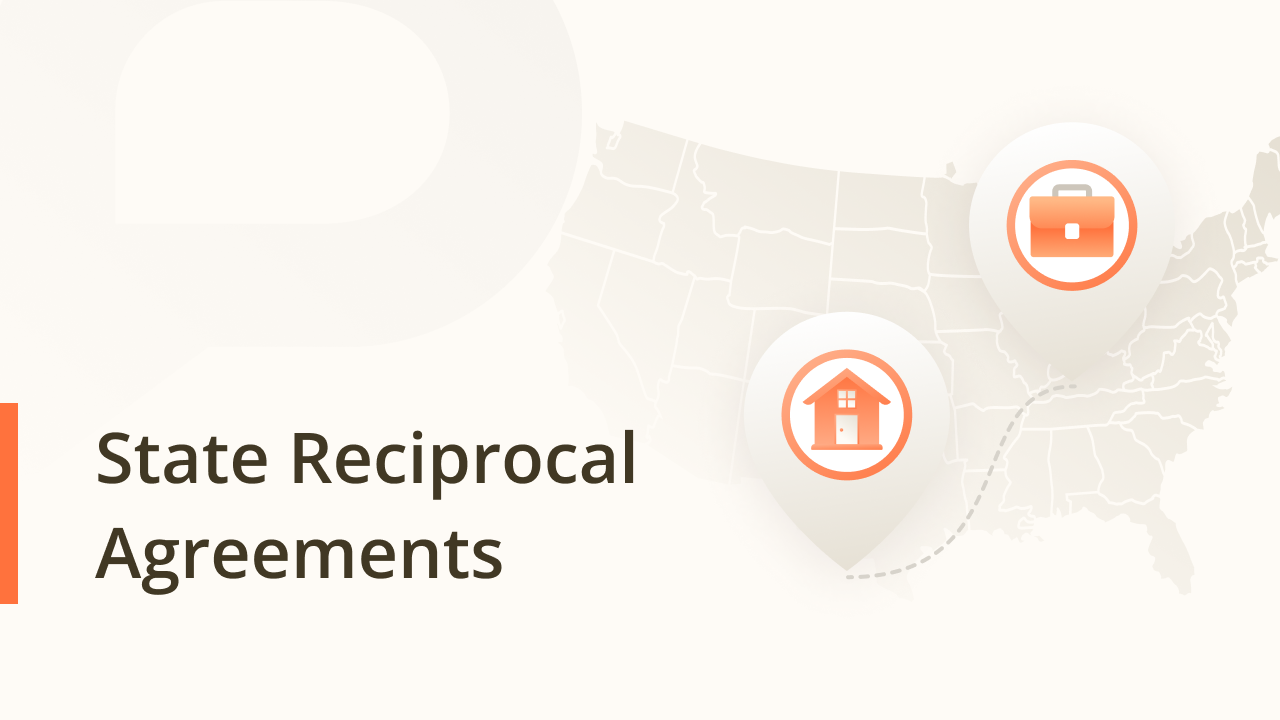Spending too much on recruitment, payroll or global HR?
We help you find the Best Providers at the lowest cost.
State reciprocal agreements are a critical factor in determining how income taxes are managed for individuals who live in one state and work in another. They exist to simplify tax compliance and filing requirements for both taxpayers and employers, alleviating the need for individuals to file multiple state tax returns. These agreements are established between neighboring states and allow residents of one state to request exemption from tax withholding in the other state where they work. As a result, they are only taxed by their state of residence.
Key Takeaways
- Reciprocal agreements facilitate tax filing for inter-state employees by allowing them to be taxed by their home state only.
- Taxpayers must proactively submit appropriate forms to their employers to benefit from reciprocal agreements.
- Not all states have reciprocal agreements, and the conditions of these agreements can differ.
Understanding Reciprocal Agreements
Navigating the complexities of state income taxes can be simplified through reciprocal agreements, which serve as vital tools for reducing tax burdens for individuals working across state lines.
Definition and Importance
Reciprocal agreements, or reciprocity agreements, are mutually beneficial pacts between multiple states. They permit residents to pay income tax to their home state rather than the state where they are employed. This bilateral agreement is crucial in simplifying tax obligations and minimizing the tax burden for workers commuting to different states.
Key Features of Reciprocity Agreements
The cornerstone of tax reciprocity is the convenience it offers taxpayers, as it eliminates the need to file multiple state tax returns. By establishing a singular focus on state income tax, these agreements can also provide a tax credit to residents for taxes paid to their employment state, effectively preventing double taxation. They underscore an essential feature: that taxation should be equitable and devoid of undue complications for interstate workers.
States with Reciprocal Agreements
As of 2023, several states have entered into reciprocal agreements to ease the tax burden on their residents. For example, Maryland and Virginia, as well as others, have established agreements that honor the principles of tax reciprocity. It is indispensable for individuals to determine if a reciprocal agreement exists between their home state and their work state to take advantage of potential tax credits and simplifications offered by such bilateral agreements.
Eligibility and Enrollment
State reciprocal agreements streamline tax obligations for individuals and employers when employees work in one state and live in another. These agreements depend on identifying the involved states and the respective qualifications for reciprocity, followed by a definite enrollment process.
Identifying Resident and Work States
The first step in navigating reciprocal tax agreements is to determine an individual’s resident state (where they reside) and work state (where they are employed). Residents who work across state lines may benefit from these agreements, which aim to simplify tax filings and prevent dual taxation by requiring tax payment only to the home state.
Qualification Criteria for Reciprocity
Qualification for participation in a reciprocal agreement requires meeting criteria set by the involved states. The individual must reside in a state where the work state has established reciprocity. They must also submit an exemption form to their employer to certify residency and to ensure that taxes are withheld for the correct state, thereby maintaining compliance with tax laws.
Enrollment Process
Enrollment in a reciprocal agreement mandates that the employee complete an exemption form and provide it to their employer. This form exempts employees from withholding taxes for the work state and confirms their participation in the reciprocal agreement. This process ensures taxes are correctly withheld for the resident state, facilitating employer compliance and reducing administrative burden for both parties.
State-Specific Reciprocal Agreements
Reciprocal agreements are special tax arrangements between certain states that allow residents who work across state lines to be taxed by their home state instead of the state where they work. These pacts are usually formed between neighboring states and can significantly simplify tax filing for cross-border workers.
Virginia and Maryland
Virginia and Maryland share a reciprocal agreement that enables residents of one state to work in the other without having to file non-resident tax returns. For instance, a Virginia resident who works in Maryland would pay income taxes to Virginia, not Maryland.
Midwest Reciprocal States
Several Midwestern states have formed mutual agreements to ease the tax burden on interstate workers. Notably:
- Illinois and Iowa
- Indiana and Wisconsin
- Michigan and Minnesota, along with Kentucky, North Dakota, and Ohio
These agreements allow residents to file tax returns and pay income taxes only to their home state.
West Coast Agreements
Currently, there are no reciprocal agreements in place on the West Coast that include states like California and Oregon. Workers living and working between these states must comply independently with each state’s tax filing laws.
Unique State Pacts
Some states have established one-of-a-kind reciprocal agreements. An example is New Jersey and the District of Columbia, which allows government employees living in one jurisdiction and working in the other to request tax withholding to their home state. West Virginia and neighboring states also have similar arrangements, providing convenience for cross-border employees.
Completing Reciprocity Forms
Employees and employers must understand the specifics of completing and submitting state reciprocity forms to ensure correct tax withholding. These forms are vital for workers who live in one state, work in another, and wish to avoid dual taxation.
Form Submission by State
Each state with reciprocal agreements has its unique form for employees to declare non-residency in their work state. For instance, Illinois workers complete Form IL-W-5-NR to declare non-residency, while Pennsylvania residents employed in Ohio use Form REV-419. Similarly, Indiana’s equivalent is Form WH-47, and Michigan’s is Form MI-W4. In West Virginia, the form titled WV/IT-104 applies. Forms typically require the employee’s personal information, state of residence, and a declaration not to withhold state income tax for the work state.
Key Forms by State:
- Illinois: Form IL-W-5-NR
- Pennsylvania: Form REV-419
- Indiana: Form WH-47
- Michigan: Form MI-W4
- West Virginia: WV/IT-104 NR
Annual Filing Requirements
Employees who file reciprocity forms, like the exemption or withholding exemption certificates, may still have annual tax obligations. For example, the Form NDW-R serves as North Dakota’s certificate of nonresidence; however, these employees must still file a tax form annually, reflecting their total income to their resident state. Mention of these annual filing requirements is typically present on the forms themselves. Employees often receive a Form W-2 from their employer, which lists all state tax withholdings and must be used for filing state taxes for their resident state.
Employees must consult with their employers or a tax professional to ensure all forms are completed and submitted to the appropriate state tax authority on time. Failure to submit these forms could result in improper withholding of state taxes, affecting an employee’s annual tax return.
Tax Implications of Reciprocal Agreements
State reciprocal agreements offer significant tax implications, particularly in how they influence the withholding of income taxes and prevent double taxation for employees working across state lines. These agreements are especially relevant in hybrid and remote work environments, where the location of earned income may differ from the employee’s state of residence.
Avoiding Double Taxation
Reciprocal agreements between states, such as those involving Washington, D.C., and neighboring states, are designed to prevent double-income taxation. This means that employees who live in one state but work in another—or, in the case of Washington, D.C., a different jurisdiction—will not have their earned income taxed by both states. Instead, withholding taxes are managed such that income taxes are only imposed by the state of residence. For instance, a worker living in Maryland but working in D.C. will have withholding taxes applied solely by Maryland, simplifying tax time and reducing the individual’s overall tax burden.
Understanding the Tax Credits
If a worker does pay income taxes to the state where work is performed, the Department of Revenue in their home state may offer a tax credit to offset the taxes paid across state lines. The Maryland v. Wynne decision reaffirmed the constitutionality of such credits. However, this situation typically occurs in the absence of a reciprocal agreement. Taxpayers must remain diligent, as they may need to file nonresident income tax returns if their state of residence and the state where they earned income do not have such an agreement in place.
Consequences of Non-Compliance
Non-compliance with reciprocal agreements and tax laws can have several consequences, including underpayment penalties. Residents and employers must ensure proper state income tax withholding to avoid penalties from the comptroller or Department of Revenue. Tax returns must correctly reflect the state of residence for income earned and taxes withheld. Additionally, taxpayers working remotely from a different state than their employer’s location should understand the reciprocity rules to ensure they do not pay unnecessary nonresident income tax.
Reciprocal Agreements in the Context of Modern Work
State reciprocal agreements are particularly relevant as the world of work evolves. They play a crucial role in determining how state and local taxes are levied for individuals working in hybrid or remote work environments.
Remote Work and Reciprocity
Remote work has transformed where and how people complete their professional tasks. When individuals live in one state but work for an employer based in another, state income taxes could generally be due for both states. However, states with reciprocal tax agreements allow these remote workers to pay income taxes to their home state only, alleviating the need to file taxes in multiple jurisdictions.
For remote employees, this simplifies tax filing obligations, making it imperative for them to understand whether their home and work states have such an agreement in place. Employers must also be cognizant of reciprocity to withhold taxes correctly.
Hybrid Work Arrangements
In hybrid work scenarios, employees split their time between an office and a remote location. These arrangements add complexity to tax considerations. Reciprocity agreements provide clarity and consistency for employees and employers for income earned in different states.
Employees in hybrid work environments must know the specifics of their state’s reciprocity agreements to understand the tax implications of their cross-border work arrangements. Employers, in turn, should keep informed on the latest tax reciprocity rules to ensure compliance and to withhold taxes correctly as per the states involved in their workforce’s hybrid arrangements.


